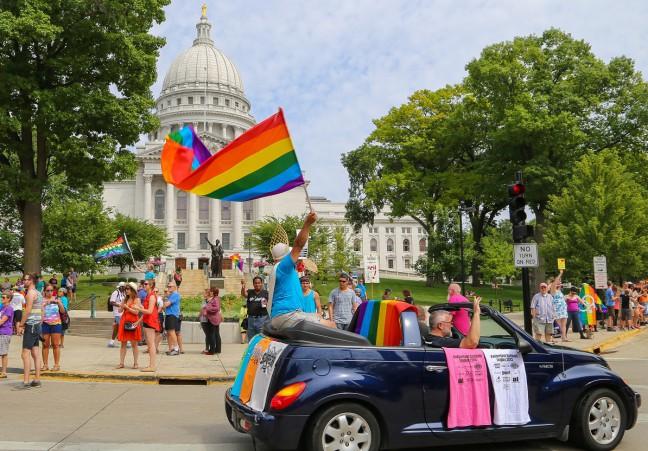Monday Oct. 5, 2014 we woke up to a Wisconsin where a whole new group of people had the freedom to marry. The rollercoaster ride that started with a court ruling this summer stating that the law passed in 2006 via referendum was unconstitutional is now over. Unfortunately, there are many people out here who now think that gay, lesbian and bisexual people have the same rights as their heterosexual counterparts, and that is completely false. We have a long road ahead of us before that statement can be considered true.
Same-sex marriages back on in Wisconsin following U.S. Supreme Court order
Although a marriage certificate grants a couple hundreds of rights that an unmarried couple doesn’t have, it does not help gay and bisexual people in other areas of their lives where they face discrimination. For instance, the federal government has yet to pass a law prohibiting employment discrimination based on sexual orientation. Although Wisconsin has a state law prohibiting this, there are 29 states that have no laws prohibiting it. A law aiming to end employment discrimination based on sexual orientation called the Employment Non-Discrimination Act has been introduced in almost every congress since 1994, but it has yet to pass. The Senate version passed 64-32 in 2013, but the House of Representatives version is currently pending a vote because the House leadership, led by Republican Speaker of the House John Boehner, refuses to bring the bill to the floor.
Also, the U.S. Food and Drug Administration prohibits men who have sex with men (MSMs) from donating blood. If you are a male and disclose to the Red Cross in its pre-donation survey that you’ve had sexual relations with another man since 1977 you’ll receive an indefinite deferral. This policy stems from the misconception that the Human immunodeficiency virus is a “gay man’s disease.” However, the contraction of sexually transmitted diseases is a risk that is not exclusive to non-heterosexual people. Anyone can contract an STD when they practice unsafe sex or sex with many partners. The outdated policy is still being enforced even though blood donations are rigorously tested for HIV and other sexually transmitted diseases like Hepatitis B and C. Even countries like Russia and Poland, countries the American government has criticized in regard to their policies toward LGBT people, do not prohibit MSMs from donating blood. These policies should focus more on sexual behavior and not sexual orientation.
Even if these problems were solved, we still wouldn’t have true equality. We should know from the passage of the Civil Rights Acts in the 1960s that legal equality doesn’t lead to equality in everyday life. Just like the continuing existence of racism in our culture, there is a culture of stereotyping and prejudice against those who aren’t heterosexual. This cannot be corrected through legislation, but it can be corrected by a change in how the media portrays LGBT people.
There are almost no gay or lesbian characters of color on major television shows. Gay men are also usually portrayed as effeminate, and if they have a partner they’re more masculine, perpetuating the notion that gay relationships imitate the gender dynamic of straight relationships. Bisexuals are often portrayed as promiscuous, if they are even represented at all. A more representative depiction of the diversity within the LGBT community would help dispel stereotypes and negative attitudes.
It’s quite important to note that marriage equality isn’t the endgame when it comes to the rights of lesbian, gay and bisexual people. Although its legalization is a huge step in the right direction, LGBT Americans are still treated as second-class citizens. We need the help of straight people who believe in the cause of equal rights to speak out for across the board equality. We also need everyone, including those within the LGBT community, to be more informed about their legal standing within their state and country as opposed to others. Only by doing this can we emancipate these Americans from second-class citizenry.
Nichalous Pogorelec ([email protected]) is a sophomore majoring in sociology.














